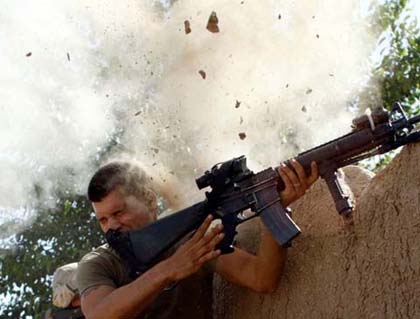The illegal killing of three British soldiers in Helmand Province by their rogue Afghan partners on July 01, 2012 once again raised the question of distrust between NATO and Afghan National Army (ANA). The trust has also been undermined by the illegal killing of innocent Afghans by NATO soldiers while relations between the guard and the guardian have deteriorated and reached at the point of no return. Afghan soldiers don't trust NATO and US forces while coalition think that Taliban have infiltrated the ranks and file of ANA.
This year, seven young British soldiers have been killed by rogue Afghan soldiers without any specific reason while three British soldiers killed by a man wearing army uniform. Long War Journal on July 01, 2012 reported the total killings of ISAF forces in Afghanistan since 2007. The Journal reported: "Afghan security personnel are now estimated to have killed 89 ISAF soldiers since May 2007. Twenty-seven of the 89 ISAF soldiers, or more than 30 percent, have been killed this year."
In a military operation news article pasted on its website, British Ministry of Defense stated: "It is with deepest sadness that the Ministry of Defense must announce that three soldiers were killed in Afghanistan yesterday, Sunday July 01, 2012. Two soldiers serving with the 1st Battalion Welsh Guards and one serving with the Royal Corps of Signals were killed in an incident at Checkpoint Kamparack Pul in the Nahr-e-Saraj district of Helmand province. Their loss will be felt deeply across Task Force Helmand. However, this will be nothing compared to the grief experienced by soldier's families……"
The recent killing of British and NATO soldiers in the hands of Afghan National Security Forces (ANSF) raised many questions that either Taliban infiltrated in the ranks of ANA or they receive secret instruction from Taliban for the killing of their coalition partners. Afghans also want to know who these people are that kill their partners illegally. The enemy has even infiltrated the ANA and ANP, working there for years and gaining trust, and now they can carry out attacks whenever they want.
Daily Telegraph reported that three quarter of ANA soldiers are motivated by squabbles and grievances. ANA chief, Sher Muhammad Karimi told reporters about the mentality of his soldiers that seventy percent were individual cases, personal decisions with their own motivation—religions and ethnic. NATO, UK and US train ANSF soldiers who turned arms on their partners.
The faulty recruitment process largely has lacked focus on proper screening of new recruits and their ethnic and sectarian backgrounds. Whether a new soldier has a shady past, has been a criminal, or has collaborated with the Taliban or other militant groups is not checked in the recruitment process, which is carried out in haste to fill the empty ranks and inflate the numbers of the ANA or ANP.
In Helmand as well the competition between rival narcotics networks with stakes in the government and the Taliban is a major underlying feature of the conflict, with all sides benefiting from the generation of instability. Conflict entrepreneurs adopt the mantle of government or opposition, to prey upon the civilian population or economic activity.
Britain's Defense Ministry repeated its resolve that the UK government wants a stable Afghanistan, a prosperous Afghanistan and is committed to suppress terrorism in the country. "The reason our troops and civilians are working with the Government of Afghanistan is simple - to protect our own national security by helping Afghans take control of theirs.
The Enduring strategic partnership document was signed by the two states. According to the British Foreign Minister's recent statement, "The document reaffirms both countries' commitment to continuing partnership and friendship. It makes clear that we will have a wide-ranging relationship with Afghanistan which will continue beyond transition and the draw-drawn of international troops."
In a last year report, submitted to the British parliament, the Government warned: "Counter-insurgency in Afghanistan cannot succeed without two elements essential for success: a legitimate, functioning government and insurgents that are deprived of external sanctuary and support. The Transition - efforts to build Afghan forces and transfer responsibilities to them - faces major obstacles and will take longer than anticipated." The question is; if a state is not functioning properly, what is the purpose of foreign forces there? Weak rule of law weakens the state in other ways, undermining its capacity to function and provide services because of corruption, diversion of resources and distortion of priorities.
As the date of NATO withdrawal approaches, violent incidents are slowly exacerbated, frustration in ANSF and civilian increased. They are anxious about the future of their children, about ethnic and sectarian war and the killing of their children at the hands of terrorist Taliban. Thus, gradual military withdrawal is not that bad. The international community should not abandon Afghanistan as it did right after the Soviet withdrawal. They have to keep up the pressure on countries, which play games with Kabul. In words of Julian Glover:
"Afghanistan is already yesterday's war, though it is still to be tomorrow's defeat. Britain has been in Afghanistan for 10 years and in Helmand for five — world wars were fought and won in less time. It is becoming one of those conflicts, which seem to have no beginning and no end, and probably no point, slipping from our enthusiasm and into history. Libya is eating up our energies instead."
The recent Reuter report warns that the NATO planned withdrawal of combat troops from Afghanistan in 2014 will likely mean a Taliban takeover and civil war, residents in the heartland of the insurgency fear, echoing a worrying recent report. Afghans in the southern city of Kandahar warn that ANSF would likely collapse when foreign combat troops left, even if they continued providing training and equipment.

